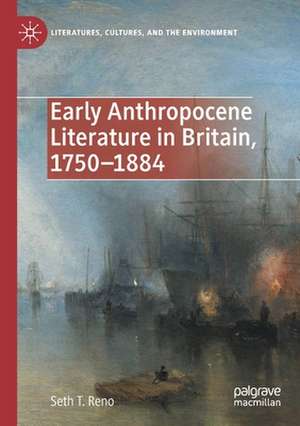Early Anthropocene Literature in Britain, 1750–1884: Literatures, Cultures, and the Environment
Autor Seth T. Renoen Limba Engleză Paperback – 20 aug 2021
| Toate formatele și edițiile | Preț | Express |
|---|---|---|
| Paperback (1) | 693.25 lei 6-8 săpt. | |
| Springer International Publishing – 20 aug 2021 | 693.25 lei 6-8 săpt. | |
| Hardback (1) | 698.62 lei 6-8 săpt. | |
| Springer International Publishing – 20 aug 2020 | 698.62 lei 6-8 săpt. |
Din seria Literatures, Cultures, and the Environment
- 18%
 Preț: 624.51 lei
Preț: 624.51 lei - 20%
 Preț: 692.35 lei
Preț: 692.35 lei -
 Preț: 388.72 lei
Preț: 388.72 lei -
 Preț: 386.81 lei
Preț: 386.81 lei - 15%
 Preț: 582.95 lei
Preț: 582.95 lei - 18%
 Preț: 727.97 lei
Preț: 727.97 lei -
 Preț: 385.84 lei
Preț: 385.84 lei - 15%
 Preț: 705.18 lei
Preț: 705.18 lei -
 Preț: 417.30 lei
Preț: 417.30 lei - 18%
 Preț: 950.21 lei
Preț: 950.21 lei -
 Preț: 389.88 lei
Preț: 389.88 lei - 15%
 Preț: 584.58 lei
Preț: 584.58 lei - 15%
 Preț: 523.22 lei
Preț: 523.22 lei - 15%
 Preț: 521.60 lei
Preț: 521.60 lei - 15%
 Preț: 581.47 lei
Preț: 581.47 lei - 18%
 Preț: 887.24 lei
Preț: 887.24 lei - 15%
 Preț: 700.75 lei
Preț: 700.75 lei - 15%
 Preț: 641.71 lei
Preț: 641.71 lei - 18%
 Preț: 786.66 lei
Preț: 786.66 lei - 18%
 Preț: 783.81 lei
Preț: 783.81 lei - 18%
 Preț: 787.15 lei
Preț: 787.15 lei - 18%
 Preț: 950.33 lei
Preț: 950.33 lei -
 Preț: 391.61 lei
Preț: 391.61 lei - 15%
 Preț: 583.13 lei
Preț: 583.13 lei - 18%
 Preț: 1001.32 lei
Preț: 1001.32 lei
Preț: 693.25 lei
Preț vechi: 815.59 lei
-15% Nou
Puncte Express: 1040
Preț estimativ în valută:
132.66€ • 136.85$ • 110.70£
132.66€ • 136.85$ • 110.70£
Carte tipărită la comandă
Livrare economică 27 martie-10 aprilie
Preluare comenzi: 021 569.72.76
Specificații
ISBN-13: 9783030532482
ISBN-10: 3030532488
Pagini: 246
Ilustrații: XVI, 246 p.
Dimensiuni: 148 x 210 mm
Greutate: 0.32 kg
Ediția:1st ed. 2020
Editura: Springer International Publishing
Colecția Palgrave Macmillan
Seria Literatures, Cultures, and the Environment
Locul publicării:Cham, Switzerland
ISBN-10: 3030532488
Pagini: 246
Ilustrații: XVI, 246 p.
Dimensiuni: 148 x 210 mm
Greutate: 0.32 kg
Ediția:1st ed. 2020
Editura: Springer International Publishing
Colecția Palgrave Macmillan
Seria Literatures, Cultures, and the Environment
Locul publicării:Cham, Switzerland
Cuprins
1. The Cradle of the Anthropocene.- 2. Volcanoes and Industrialization in Early Anthropocene Literature.- 3. Rivers, Canals, and Commerce in the Early Anthropocene.- 4. Clouds and Climate Change in the Nineteenth Century.- Epilogue: Modernism and the Anthropocene.
Recenzii
“Seth T. Reno’s Early Anthropocene Literature in Britain, 1750–1884 cuts across more than a century’s worth of aesthetic and scientific cultural production … . Early Anthropocene Literature in Britain surveys a wide range of writings that self-consciously chronicle … . Early Anthropocene Literature in Britain surveys an incredibly rich archive and observes numerous connections between anthropogenic enterprise and geophysical processes.” (Devin M. Garofalo, Victorian Studies, Vol. 65 (2), 2023)
Notă biografică
Seth T. Reno is Associate Professor of English at Auburn University Montgomery, USA. He is author of Amorous Aesthetics: Intellectual Love in Romantic Poetry and Poetics, 1788–1853 (2019), editor of Romanticism and Affect Studies (2018), and co-editor of Wordsworth and the Green Romantics: Affect and Ecology in the Nineteenth Century (2016).
Textul de pe ultima copertă
This book questions when exactly the Anthropocene began, uncovering an “early Anthropocene” in the literature, art, and science of eighteenth- and nineteenth-century Britain. In chapters organized around the classical elements of Earth, Fire, Water, and Air, Seth Reno shows how literary writers of the Industrial Era borrowed from scientists to capture the changes they witnessed to weather, climate, and other systems. Poets linked the hellish flames of industrial furnaces to the magnificent, geophysical force of volcanic explosions. Novelists and painters depicted cloud formations and polluted urban atmospheres as part of the emerging discipline of climate science. In so doing, the subjects of Reno’s study—some famous, some more obscure—gave form to a growing sense of humans as geophysical agents, capable of reshaping Earth itself. Situated at the interaction of literary studies, environmental studies, and science studies, Early Anthropocene Literature inBritain tells the story of how writers heralded, and wrestled with, Britain’s role in sparking the now-familiar “epoch of humans.”
Caracteristici
Documents the emergence of geology, natural history, climatology, and industrialization in the 1700–1800s Draws from literary, scientific, political, and philosophical texts Extends the existing canon of climate change literature and our understanding of the foundations of the Anthropocene
